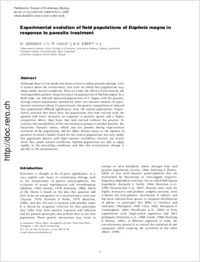Experimental evolution of field populations of Daphnia magna in response to parasite treatment
- Zbinden, Marc Département de Biologie, Unité d’Ecologie et d’Evolution, Université de Fribourg, Switzerland - Zoological Institute, Universität Basel, Basel, Switzerland
- Haag, Christoph R. Département de Biologie, Unité d’Ecologie et d’Evolution, Université de Fribourg, Switzerland - Tvärminne Zoological Station, Hanko, Finland
- Ebert, Dieter Département de Biologie, Unité d’Ecologie et d’Evolution, Université de Fribourg, Switzerland - Zoological Institute, Universität Basel, Basel, Switzerland - Tvärminne Zoological Station, Hanko, Finland
-
17.03.2008
Published in:
- Journal of Evolutionary Biology. - 2008, vol. 21, no. 4, p. 1068-1078
Coevolution
Cost of resistance
Experimental evolution
Genetic diversity
Microsporidia
Rapid adaptation
Resistance
Tolerance
English
Although there is little doubt that hosts evolve to reduce parasite damage, little is known about the evolutionary time scale on which host populations may adapt under natural conditions. Here we study the effects of selection by the microsporidian parasite Octosporea bayeri on populations of Daphnia magna. In a field study, we infected replicated populations of D. magna with the parasite, leaving control populations uninfected. After two summer seasons of experimental evolution (about 15 generations), the genetic composition of infected host populations differed significantly from the control populations. Experiments revealed that hosts from the populations that had evolved with the parasite had lower mortality on exposure to parasite spores and a higher competitive ability than hosts that had evolved without the parasite. In contrast, the susceptibility of the two treatment groups to another parasite, the bacterium Pasteuria ramosa, which was not present during experimental evolution of the populations, did not differ. Fitness assays in the absence of parasites revealed a higher fitness for the control populations, but only under low population density with high resource availability. Overall, our results show that, under natural conditions, Daphnia populations are able to adapt rapidly to the prevailing conditions and that this evolutionary change is specific to the environment.
- Faculty
- Faculté des sciences et de médecine
- Department
- Département de Biologie
- Language
-
- English
- Classification
- Biology, life sciences
- License
- License undefined
- Identifiers
-
- RERO DOC 9381
- DOI 10.1111/j.1420-9101.2008.01541.x
- Persistent URL
- https://folia.unifr.ch/unifr/documents/300572
Statistics
Document views: 210
File downloads:
- zbinden_eef.pdf: 178
